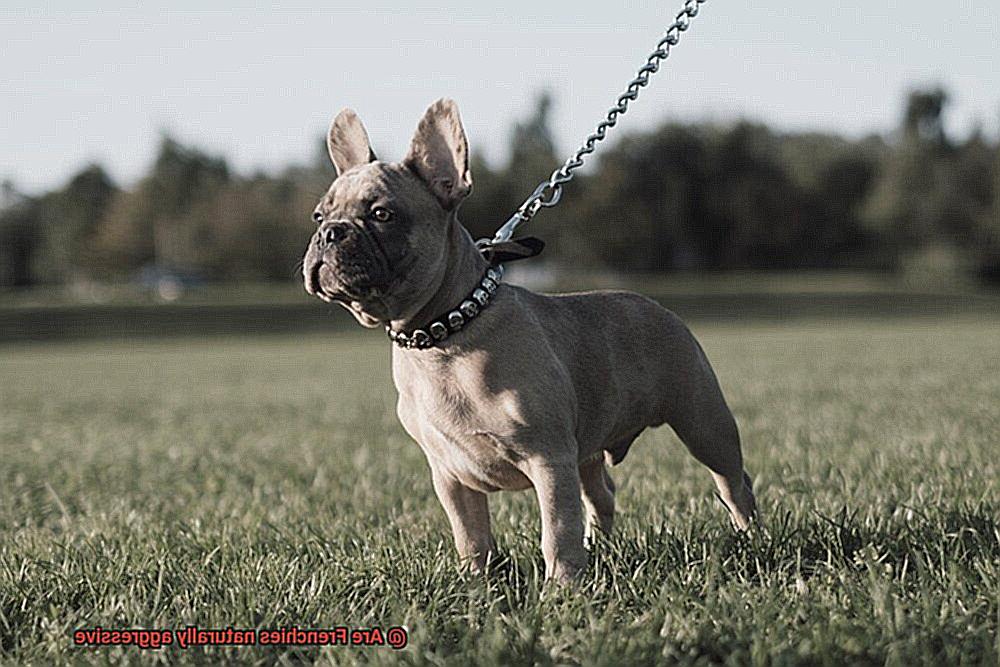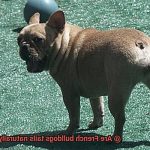Are Frenchies naturally aggressive?
French Bulldogs have taken the dog world by storm, captivating enthusiasts worldwide with their irresistible charm and unique looks. But amidst all the buzz, a common misconception tends to rear its ugly head: that Frenchies are naturally aggressive. This notion not only misrepresents their true temperament but also has far-reaching consequences on their reputation and the potential for misunderstandings between owners and their furry companions.
In this blog post, we’re here to set the record straight. We’ll take an unbiased look at the evidence, digging into the breed’s history, genetics, and personal experiences from experts and owners alike. Together, we’ll unravel whether aggression is an innate trait or simply a misconception fueled by external factors.
Approaching this topic with an open mind is crucial. By objectively examining the available evidence, we can gain a deeper understanding of French Bulldogs’ true nature. This knowledge is essential not only for prospective owners but also for dispelling misleading stereotypes and promoting responsible dog ownership. So let’s jump right in and discover the fascinating truth behind French Bulldogs and their alleged aggression.
Are French Bulldogs Naturally Aggressive?
Contents
- 1 Are French Bulldogs Naturally Aggressive?
- 2 Factors That Contribute to Aggression in Frenchies
- 3 The Benefits of Socialization for French Bulldogs
- 4 Training Your Frenchie to Reduce Aggression
- 5 How to Create a Loving Environment for Your Frenchie
- 6 Signs of Aggression in French Bulldogs
- 7 Professional Help for Dealing with Aggression in Frenchies
- 8 Conclusion
French Bulldogs, also known as Frenchies, are beloved for their adorable looks and affectionate nature. However, there’s a misconception that these lovable pups are naturally aggressive.
In this blog post, we’ll explore the truth behind this myth and provide insights into the factors that influence a French Bulldog’s behavior.
Breed History:
French Bulldogs have a rich history as companion dogs. Bred in the 19th century in England, they were initially created to be loving and loyal companions, not aggressive guard dogs. Their purpose was to provide companionship and warmth to their owners.
Individual Temperament:
While French Bulldogs are generally friendly and good-natured, it’s important to remember that each dog has its own personality. Some Frenchies may display signs of aggression due to genetics or other underlying factors. However, this is not representative of the entire breed.
Training and Socialization:
Proper training and socialization are crucial for all dog breeds, including French Bulldogs. Early socialization exposes puppies to different environments, people, and animals, helping them develop into well-rounded adults. Positive reinforcement training methods should be used to establish a strong bond with your Frenchie and encourage appropriate behavior.
Genetics:
Responsible breeders play a vital role in maintaining the breed’s temperament. By selectively breeding French Bulldogs with friendly and stable personalities, they aim to produce puppies with good temperaments. However, genetics alone do not determine a dog’s behavior; upbringing and environment also play significant roles.
Signs of Aggression:

It’s essential to differentiate between aggression and other behaviors like fear or anxiety that may manifest as aggression. Signs of aggression can include growling, snarling, biting, or intense staring. If you notice any signs of aggression in your Frenchie, consult with a professional dog trainer or behaviorist who can help address the issue.
Factors That Contribute to Aggression in Frenchies
When it comes to understanding aggression in French Bulldogs, it’s important to consider various factors that can contribute to this behavior. By recognizing and addressing these factors, owners can help prevent or manage aggression in their beloved pets.
- Genetics: Just like humans, dogs inherit certain traits from their parents. While French Bulldogs are generally known for their friendly and affectionate nature, some individuals may have genetic predispositions to aggression. This is why it’s crucial to choose a reputable breeder who prioritizes temperament and health when selecting breeding pairs.
- Socialization: Proper socialization is key to preventing aggression in French Bulldogs. Exposing them to different people, animals, and environments from a young age helps them feel comfortable and confident in various situations. Regular positive experiences can help prevent fear-based aggression and ensure that your Frenchie becomes a well-adjusted and non-aggressive companion.
- Training: Consistent and positive training is essential for all dogs, including Frenchies. Without proper training, they may resort to aggressive behaviors as a means of communication or when they feel threatened or anxious. Teaching basic obedience commands and providing mental stimulation through interactive toys or puzzle games can help redirect their energy and prevent aggression.
- Fear and Anxiety: Like humans, dogs can experience fear and anxiety. French Bulldogs that have not been adequately socialized or have had negative experiences may develop fear-based aggression as a defense mechanism. Identifying triggers and using positive reinforcement techniques or seeking professional help can help alleviate their anxiety and reduce aggressive behaviors.
- Medical Issues: It’s important to consider that aggression in French Bulldogs can sometimes be linked to underlying medical conditions. Pain, hormonal imbalances, or neurological disorders can manifest as aggression in dogs. If you notice sudden changes in behavior, it’s essential to consult with a veterinarian to rule out any potential medical causes.
- Resource Guarding: Some French Bulldogs may exhibit aggression when it comes to guarding their possessions, such as food or toys. This behavior can be managed through proper training and teaching them that resources are not scarce and will not be taken away from them.
- Lack of Exercise and Mental Stimulation: French Bulldogs are generally a low-energy breed, but they still require regular exercise and mental stimulation. Without enough physical activity or mental enrichment, they can become bored and frustrated, which may lead to aggressive behaviors. Providing daily walks, playtime, and interactive toys can help prevent behavioral issues caused by pent-up energy.
The Benefits of Socialization for French Bulldogs
French Bulldogs are known for their unique personalities and adorable appearances. However, like any other breed, they can benefit greatly from socialization. In this section, we will explore the numerous advantages of socializing your French Bulldog, including improved behavior, reduced aggression, increased confidence, better communication skills, and a happier, well-adjusted pet.
Developing Appropriate Behavior and Manners:
Socialization helps French Bulldogs develop appropriate behavior and manners. Through exposure to different people, animals, and environments, they learn to adapt and become more well-rounded pets. This includes learning important skills such as bite inhibition, which is crucial for preventing aggressive behavior.
Preventing Fear-Based Aggression and Anxiety-Related Behaviors:
Limited exposure to new experiences can lead to fear-based aggression or anxiety-related behaviors in dogs. By socializing French Bulldogs at an early age, they become more comfortable and confident in different situations and environments. This helps prevent the development of these negative behaviors.
Tolerance and Acceptance:
Socialization also helps French Bulldogs become more tolerant and accepting of different types of stimuli. This reduces the likelihood of aggression towards unfamiliar people or animals. Additionally, it enhances their communication skills and body language, which is essential for appropriate interaction with other dogs.
Easier Handling and Reduced Behavioral Issues:
Well-socialized French Bulldogs are more likely to be calm, friendly, and confident in new situations. This makes them easier to handle and less prone to behavioral issues. They are more adaptable to changes in their environment and less likely to exhibit destructive or anxious behaviors.
Starting Early but Never Too Late:
Socialization should ideally begin during the puppy stage when French Bulldogs are most receptive to learning and forming positive associations. However, even adult French Bulldogs can benefit from socialization if they have had limited exposure to new experiences in the past. It’s never too late to start.
Tips for Successful Socialization:
- Gradually introduce your French Bulldog to new people, animals, sounds, and environments in a positive and controlled manner.
- Use positive reinforcement techniques such as treats, praise, and rewards to encourage desired behavior during socialization sessions.
- Prioritize their safety and comfort throughout the process. Be mindful of their body language and stress signals.
- Regularly socialize your French Bulldog throughout their life to maintain their social skills and prevent regression.
Training Your Frenchie to Reduce Aggression
French Bulldogs are known for their adorable appearance and friendly nature, but like any breed, they can sometimes exhibit aggressive behavior. Whether it’s territorial aggression, fear aggression, or resource guarding, it’s important to address and manage these behaviors to ensure a harmonious relationship with your Frenchie.
Training your Frenchie to reduce aggression is key, and here’s why positive reinforcement and consistent training are crucial in achieving this goal.
Importance of Training
Training plays a vital role in reducing aggression in French Bulldogs. While some dogs may have a genetic predisposition to aggression, proper training can help manage and minimize these behaviors. By teaching your Frenchie appropriate ways to communicate and interact with others, you can prevent aggressive situations from escalating.
Early Start and Socialization
Starting training at an early age is crucial. This allows you to establish good behavior patterns and prevent aggression from becoming deeply ingrained. Additionally, socialization during puppyhood is essential for Frenchies. Exposing them to different people, animals, and environments helps them develop social skills and reduces fear-based aggression.
Positive Reinforcement

French Bulldogs respond well to positive reinforcement training techniques. They thrive on rewards and praise, making it easier to motivate them to learn and behave appropriately. Using treats, toys, and verbal praise can be powerful tools in shaping their behavior positively.
Consistency and Repetition
Consistency is key when it comes to training your Frenchie. Setting clear boundaries, enforcing rules consistently, and rewarding desirable behaviors while ignoring or redirecting aggressive behaviors help reinforce positive habits. Consistent training creates a predictable environment that your Frenchie can understand and feel secure in.
Training Exercises
There are specific exercises that can help reduce aggression in French Bulldogs. Teaching basic obedience commands like sit, stay, and leave it can give you better control over your Frenchie’s actions. Additionally, leash training can help prevent aggressive reactions while walking, and teaching them not to jump on people can reduce territorial aggression.
Managing the Environment
Managing your Frenchie’s environment is crucial in preventing triggers for aggression. If your Frenchie shows aggression towards certain situations or stimuli, it’s important to avoid or manage those triggers. Gradual desensitization under controlled circumstances can also help your Frenchie become more comfortable and less reactive.
Seeking Professional Help
If your Frenchie’s aggression persists or worsens despite consistent training efforts, it may be beneficial to seek professional help from a certified dog trainer or behaviorist. These experts can assess the situation, provide personalized guidance, and create a behavior modification plan tailored to your Frenchie’s specific needs.
How to Create a Loving Environment for Your Frenchie
French Bulldogs, or Frenchies, are known for their affectionate and friendly nature. However, like any other dog breed, their behavior and temperament can be influenced by several factors, including their environment and upbringing. Creating a loving environment for your Frenchie is essential to ensure their overall well-being and happiness. In this guide, we will explore some key steps to help you create a loving environment for your beloved Frenchie.
Establishing a Strong Bond:
One of the first steps in creating a loving environment for your Frenchie is to establish a strong bond with them. Spend quality time with your dog, engage in activities they enjoy, and provide plenty of positive reinforcement through treats, praise, and affectionate gestures. A strong bond will not only make your Frenchie feel loved but also strengthen the trust between you and your furry friend.
Providing a Safe and Comfortable Living Space:
Providing a comfortable and safe living space is crucial for your Frenchie’s well-being. Make sure they have a designated area where they can rest and relax, such as a cozy bed or crate. Ensure that the area is free from any hazards or potential dangers. Additionally, consider creating a calm and soothing atmosphere by playing soft music or using calming scents like lavender.
Engaging in Physical and Mental Activities:
Regular exercise is vital for keeping your Frenchie physically and mentally stimulated. Take them for daily walks, play interactive games, or engage in obedience training sessions. This not only helps in maintaining their overall health but also strengthens the bond between you and your furry friend. Remember to tailor the activities to your Frenchie’s age, health, and energy level.
Socialization:
Socialization is crucial for your Frenchie’s development and behavior. Introduce them to different people, animals, and environments from an early age. This helps them become well-adjusted, confident, and friendly dogs. Take them to dog parks or arrange playdates with other well-behaved dogs to encourage positive social interactions.

Positive Reinforcement and Consistent Rules:
Always approach your Frenchie with love, patience, and positive reinforcement. Avoid harsh punishments or yelling, as this can lead to fear or aggression in your dog. Instead, focus on reward-based training methods and consistently reinforce good behavior. Establish clear rules and boundaries for your Frenchie and ensure that all family members follow them consistently.
Signs of Aggression in French Bulldogs
French Bulldogs are known for their friendly and playful nature, but like any dog breed, they can display signs of aggression under certain circumstances. It is crucial for French Bulldog owners to be aware of these signs and understand how to address them effectively. In this guide, we will explore the various signs of aggression in French Bulldogs and provide practical tips for managing and addressing these behaviors.
Growling:
One of the most common signs of aggression in French Bulldogs is growling. When a Frenchie feels threatened or uncomfortable, they may emit a low rumbling sound as a warning sign. Owners should never ignore growling and should take immediate action to prevent any potential escalation. This can include removing the dog from the situation, redirecting their attention, or seeking professional help if necessary.
Snarling or Baring Teeth:
Snarling or baring teeth is a more intense form of growling and indicates that the Frenchie is feeling highly threatened or defensive. This behavior should be addressed immediately to prevent any potential harm to humans or other animals. Owners should consult with a professional dog trainer or behaviorist who specializes in aggression to develop a behavior modification plan.
Lunging or Snapping:
French Bulldogs may display aggressive behavior through lunging or snapping when they feel cornered or believe their personal space is being invaded. It is essential for owners to create a safe environment for their Frenchies to minimize these reactions. This can include providing them with a designated space where they can retreat to when feeling overwhelmed and ensuring that visitors or other animals respect their boundaries.
Resource Guarding:
Resource guarding is another form of aggression commonly seen in French Bulldogs. They may become possessive over food, toys, or other items and exhibit aggressive behavior towards anyone who attempts to approach or take away these resources. Owners should establish clear boundaries and implement positive reinforcement training techniques to address this issue, such as teaching the “drop it” or “leave it” commands.
Territorial Aggression:
French Bulldogs may display territorial aggression, especially towards unfamiliar people or animals entering their territory. This can manifest as excessive barking, growling, or even physical aggression. Proper socialization and training from an early age can help minimize territorial behaviors. Gradual exposure to new people and situations, along with positive reinforcement, can help your Frenchie feel more comfortable and less likely to show aggression.
Health Issues:
It’s important to note that aggression in French Bulldogs can also be a result of underlying health issues or pain. If your Frenchie suddenly displays aggressive behavior without any apparent reason, it is recommended to consult with a veterinarian to rule out any medical causes.
Professional Help for Dealing with Aggression in Frenchies
French Bulldogs are typically known for their friendly and affectionate nature. However, some individuals may display aggression due to various factors. Dealing with aggression in French Bulldogs can be a challenging issue for dog owners.
In this article, we will discuss the importance of seeking professional help when addressing aggression in Frenchies and provide practical tips for managing this behavior.
Understanding the Causes of Aggression:
Aggression in French Bulldogs can be influenced by both genetic and environmental factors. While some Frenchies may have a genetic predisposition towards aggression, it is important to note that not all individuals will display aggressive behavior. Environmental factors such as poor socialization, fear, or past traumatic experiences can also contribute to aggression.
The Role of Professional Help:
- Thorough Evaluation: Seeking professional help from a qualified veterinarian or animal behaviorist is crucial when dealing with aggression in French Bulldogs. They can conduct a comprehensive evaluation to determine the root cause of the aggression and develop an appropriate treatment plan.
- Medical Examination: Before addressing behavioral issues, it is essential to rule out any underlying medical conditions that could be causing or contributing to the aggression. Pain, illness, or discomfort can often manifest as aggression in dogs. A thorough veterinary examination will ensure your Frenchie’s health is not compromised.
- Behavior Modification Techniques: Professionals specializing in canine behavior can guide you through behavior modification techniques tailored to your Frenchie’s specific needs. These techniques involve identifying triggers and implementing positive reinforcement to modify your dog’s response.
- Medication Management: In some cases, medication may be prescribed to manage the aggression in French Bulldogs. Anti-anxiety drugs or SSRIs can help reduce anxiety and improve overall behavior. However, medication should always be used under professional supervision.
Tips for Successful Management:
- Educate Yourself: Learn about canine behavior and body language to better understand your Frenchie’s needs and warning signs of aggression. This knowledge will help you effectively communicate with your dog.
- Consistency and Positive Reinforcement: Create a structured and predictable environment for your Frenchie, as consistency can help reduce stress and anxiety. Use positive reinforcement techniques to reward desirable behaviors.
- Patience and Time: Dealing with aggression in French Bulldogs requires patience and time. Consistent training and behavior modification efforts, along with professional guidance, can lead to positive results over time.
U9FfZtV10_Y” >
Conclusion
In conclusion, it is important to recognize that Frenchies are not naturally aggressive. While they may have a reputation for being stubborn or territorial, these traits can be managed through proper training and socialization. It is crucial to understand that aggression in any dog breed is usually a result of poor breeding, lack of training, or mistreatment by owners.
French Bulldogs are known for their friendly and affectionate nature. They thrive on human companionship and are generally good with children and other pets when properly introduced. However, like any dog breed, Frenchies can exhibit aggression if they feel threatened or fearful.
To ensure a well-behaved and non-aggressive Frenchie, early socialization is key. Exposing them to various people, animals, and environments from a young age will help them develop confidence and adaptability. Positive reinforcement training methods should also be employed to encourage good behavior and discourage aggressive tendencies.
It is worth noting that individual temperament can vary within the breed. Some Frenchies may naturally have a more dominant or protective disposition, but this does not equate to inherent aggression. With the right guidance and care, any potential behavioral issues can be addressed effectively.
In conclusion, French Bulldogs are not inherently aggressive dogs. Their temperament largely depends on how they are raised and trained by their owners.




